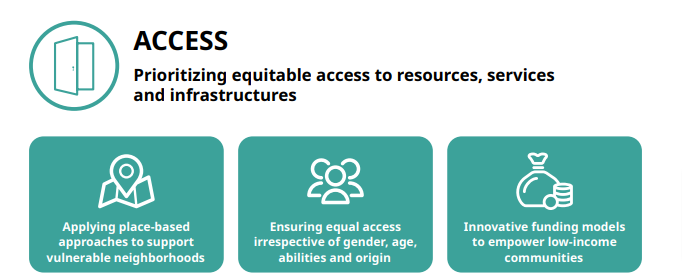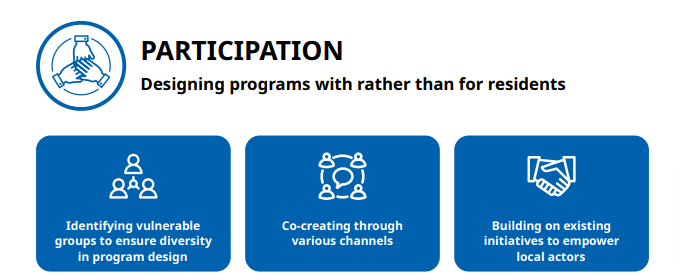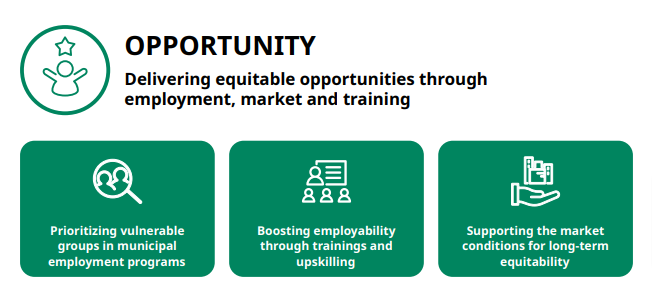To support equitable and inclusive transitions, ICLEI collaborated with cities from different world regions under the Urban Transitions Alliance project to create a methodology that allows mapping the social equity outcomes of local sustainability plans across three dimensions: access, participation, and opportunity.
For each dimension, tools and recommendations for action were identified, as well as indicators to monitor progress and best practices from cities of the ICLEI network to learn from. An initial version of this methodology was tested with the city of Turku as part of the Circular Turku project.
The “Equitable transitions guidebook: Local tools for fair and inclusive sustainability programs” compiles these learnings and was released on June 30 at the Eleventh Session of the World Urban Forum (WUF11).
The guidebook aims to provide insights and recommendations illustrated with best practices, resources and tools for city practitioners to better understand and unpack what social equity means for sustainability programs at the local level.
For this purpose, social equity is defined along three dimensions:
Access
In urban environments, some residents have limited access to resources, services and infrastructures because they live in a certain part of a city, due to demographic factors such as age, gender, origin or the language they speak, or because they are simply unable to afford it.
To ensure that no individual or group in the city is excluded or left behind, local governments can strengthen inclusive access by identifying access gaps and implementing targeted support measures for those in need. They can also prioritize inclusive urban planning to ensure physical infrastructures serve all users.
Participation
This dimension refers to the governance aspect of equitable design, emphasizing both the involvement of residents in the process and the engagement of underrepresented voices to ensure no one is left behind. The more programs are designed with rather than for residents, meaningfully engaging different groups using various channels, the more they meet local needs and generate long-term impacts.
This can be ensured by prioritizing collaborative co-creation with local agents and by empowering existing community initiatives that are already active in sustainability.
Opportunities
The COVID-19 pandemic-induced lockdowns and recessions, combined with increased automation and digitalization, have created a highly uncertain outlook for job markets across all world regions.
The Build Back Better movement calls for all governments to prioritize investments in sustainability to provide the jobs of tomorrow. However, not all sustainability jobs are created equal and will be distributed fairly.
To offer fair perspectives for all, local governments can target increased diversity in employment in public institutions, the provision of career perspectives through training and support programs and strengthening and diversifying the local labor market.
- Map social risks and opportunities associated with sustainability programs and initiatives at the local level
- Learn about key equity aspects to consider when designing sustainability programs and apply concrete policy instruments to support social equity in such programs
- Identify suitable indicators to monitor social impacts over time in a holistic manner
The equity-focused content is grounded into cities’ practices and features over 30 concrete examples from cities around the world. From Glasgow’s Place Standard tool to Baltimore’s methodology to identify healthy food priority areas, the guidebook offers many replicable tools for your city to start planning sustainability programs with a strong social equity focus.
The Equitable Transitions Guidebook is available here.
Editor’s Note: The opinions expressed here by the authors are their own, not those of Impakter.com — In the Featured Photo: “City for people” by Rosana Grecchi. Featured Photo Credit: © Rosana Grecchi, Sustainably Yours / European Environmental Agency.













